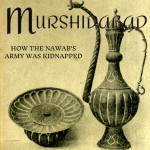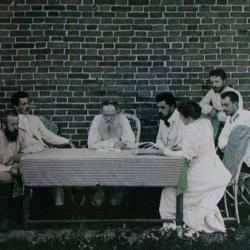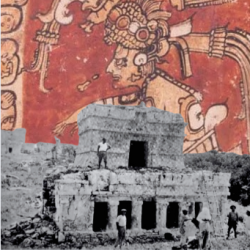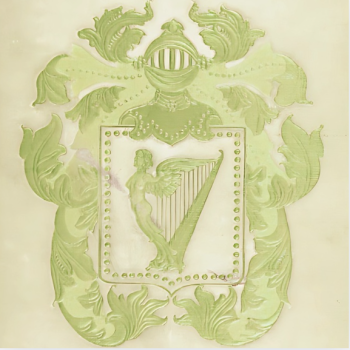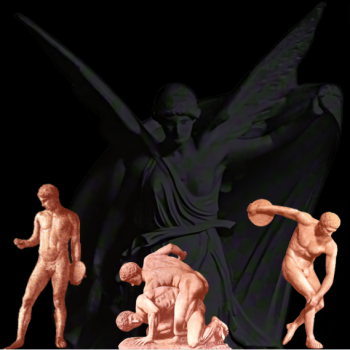GOPAL BABA
Charles Johnston
April 1889.
We first saw Gopal Baba on an early April morning, while the grass and trees of Berhampore Square were still white with dew, sparkling in the yellow radiance of the dawn. Verochka and I were wending homeward toward our barrack bungalow, from a walk along the high embankment of the Bhagirathi, replenished now by the first melting of Himalayan snows. I have a fancy that, crowned with huge helmets of white sola pith, we looked like peripatetic mushrooms to the brown-skinned pious Brahmans who, pressing the triple cord between their palms, stood waist-deep in the turbid water, praying their sins away in the sacred tide.
We had started before sunrise, walking down stream past Ghorabazaar and the dak-bungalow, under a wide spreading silk-cotton tree now draped in bright green leaves, which we had admired in February, month of blossoms, splendidly decked with crimson flowers, like a blazing torch against the green. A little farther down the bund, we had a strange encounter that wonderfully expressed one of the hidden feelings of our hearts. From the boat which had arrived from Calcutta, and lay moored by the embankment, emerged a huge man, evidently no Bengali, nor of any Indian race we knew. Bronzed, with the face of an eagle, he wore a loose, exotic-looking jacket and very wide trousers, and his shaggy head was crowned with a red fez. He swung along, majestic, masterful, with lordly disdain in every feature, every movement.
“I think he is a Turk,” said Verochka. “I like Turks, they are such splendid men!”—a generous concession from a Russian whose kin had fought against them under Khars.
The big, masterful man swung on to meet us with long strides, and, some dozen paces off, seeing that we were watching his oncoming with sympathetic eyes, he stopped short, threw up his hands with magnificent disdain, and in a voice with fine reverberating undertone, exclaimed—
“My God! What a country!”
Then he paused a moment, and broke out again—
“My God! What people!”
Be this your epitaph! O Bengalis!
We learned that the big Turk had got stranded in Howrah, and was now making his way up country in search of Sunni coreligionists. We contributed to his wants, and bade him go bravely on, in the name of Allah, merciful and compassionate.
Homeward wending, then, from this encounter, we had turned from the bund toward the square, and were passing the garden of Ritchie’s kuti. There was a pyramid of scarlet-trumpeted hibiscus that flamed in the forehead of the morning. As we skirted Richie’s garden, conscious of the growing heat, we saw Martha coming toward us, having been deputed, as so often before, to wheel little Theo forth to enjoy the morning air while the grass still white with pearls and festoons gossamer hung from the date palms.
Theo was beginning to feel the oncoming hot season. She was pale, a tiny angel of a child, who should have been running barefoot in English meadows among cuckoo-flowers, gathering the sweet life of spring and the color of the daisy-tips in her cheeks. Martha, in deep-voiced Hindi, was trying to cheer and entertain her, and Theo courteously tried to be receptive and to show herself entertained, but her attention flagged, and the far-away eyes matched rather sadly the little pale cheeks.
So much we saw as we approached: Martha with deep concern in his dark, honest face. Theo rather limp, but winsome as ever. Then Gopal Baba suddenly upon the scene. I think had been in Ritchie’s garden, and came forth by a wicket-gate in the wall. One could see that he a Brahmin, fine-featured, cinnamon-skinned, wearing a white loin-cloth, and with a scarf of white muslin his shoulders; barefoot and bare-headed, with long hair and a short, curly beard just touched with gray. He wonderfully lithe, his step swift and springy, his whole bearing full of forceful grace. He walked beside Theo her baby-carriage, smiling with wonderfully gentle, luminous eyes, looked into her peaked little face, and laid brown hand on her little white hand, which rested rather wearily on wicker rim of the perambulator.
The first thing that struck me was that Martha did not show the least wish to interfere. As a Mahometan, he was suspicious of all Hindus; as an orderly, he had an official’s high disdain for all lay folk; as a trusted minion of Ritchie and, even more, of Margie who, indeed, had conferred on him the honored name of the maiden of Bethany, he should have been, and on all occasions was, very alert to guard little Theo from alien approach, be it of man or woman, elephant, or sunstroke. Yet he did not check Gopal Baba, or bid him begone for a Hindu vagabond, which, had he done it, would not have surprised me in the least. Indeed, I saw him smiling down at Gopal Baba, and he stopped the baby-carriage, so that the gray barbarian might, if so minded, talk at his ease with the Christian child.
It seemed, however, that Baba was not so minded. He had laid his brown hand on Theo’s white little fingers, and he kept it there, bending down over her, smiling with bright serenity; with joy, not pity, in his eyes. Little Theo, when he first touched her hand, looked up, with a quick, questioning, intuitive, baby glance; and, as her eyes met his, she too began to smile, her little face growing more animated and a tinge of color coming into her cheeks. She looked like her old of the cold season, and one could see answering reassurance and satisfaction kindling in Martha’s eyes.
Gopal Baba, as I have said, had not spoken to the little girl, nor did he now; yet one could see that a very good understanding was established between them, and a sweet serenity filled the dear little baby face. She drew a long breath, sighed happily like a little child awaking from sleep, and then laughed a happy, gentle little laugh, as she looked up at Gopal Baba. With her other hand she began to pat that dark hand of his, which still lay on hers, and in her touch and in her eyes there were caresses.
The whole thing lasted but a moment, and then Gopal Baba raised his serene eyes from the child to Martha; then, straightening himself up, he turned and walked away, with rapid, noiseless steps, like a gentle, benevolent, panther.
When I was in cutcherry later in the day, in the huge barrack across the square, I had occasion to see Ritchie, and I told him of this early morning happening.
“Oh, yes!” he said, with that pleasant laugh of his. which remains one of my best memories of India, “that was Gopal Baba: quite a crony of Theo’s, you know!”
“Who is Gopal Baba?” I asked.
“Oh, a kind of crazy saint!” said Ritchie, smiling. “I don’t quite know where he comes from. I suppose he has always been here; part of the station, you know. You ought to have seen him at work in my garden a week ago. You know the big peepal, the great rubber tree that overhangs the square? Some of the branches had grown too far over the house, and I was afraid of the damp in the rains, especially for Theo. I was talking to Martha about these branches, saying they ought to be cut, when Gopal Baba came up to us, debonair as always. He never seems to want anything. Gopal Baba listened, and heard Martha reply that it would be dangerous work; it would not be easy to get anyone to undertake it.
“Gopal Baba smiled and went away; half an hour later he came to the house with a hashua, went quickly up to the roof without saying a word to anyone, swung himself into the tree and began to lop off the overhanging branches.[1] The way he skipped from one to another was the most fearless thing I ever saw; he was absolutely birdlike.”
Verochka and I were forth on another early morning walk, a few days later, this time up the river, and were looking down from the high bund at a quaint little weather-stained temple with twisted pillars, under a many-stemmed shaggy banyan tree, when we descried Gopal Baba sitting on a stone bench before the temple, still as a statue, in happy contemplation. He looked up and smiled. It was, I think, his home.[2]
← Table Of Contents →
SOURCES:
[1] “[Hashua:]A short-handled bill-hook for chopping sugar-cane.” [Johnston, Charles. “Helping To Govern India.” The Atlantic Monthly Vol. 108, No. 5. (November 1911): 643-652.]
[2] Johnston, Charles. “A Holy Man: Helping To Govern India.” The Atlantic Monthly. Vol. CX, No. 5. (November 1912): 653-659.


